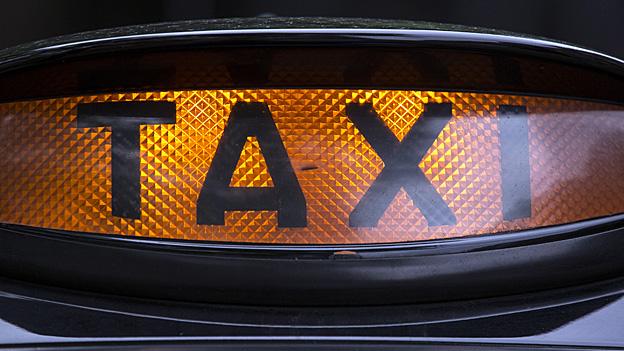Uber sparks taxi row in South Africa's Johannesburg
- Published
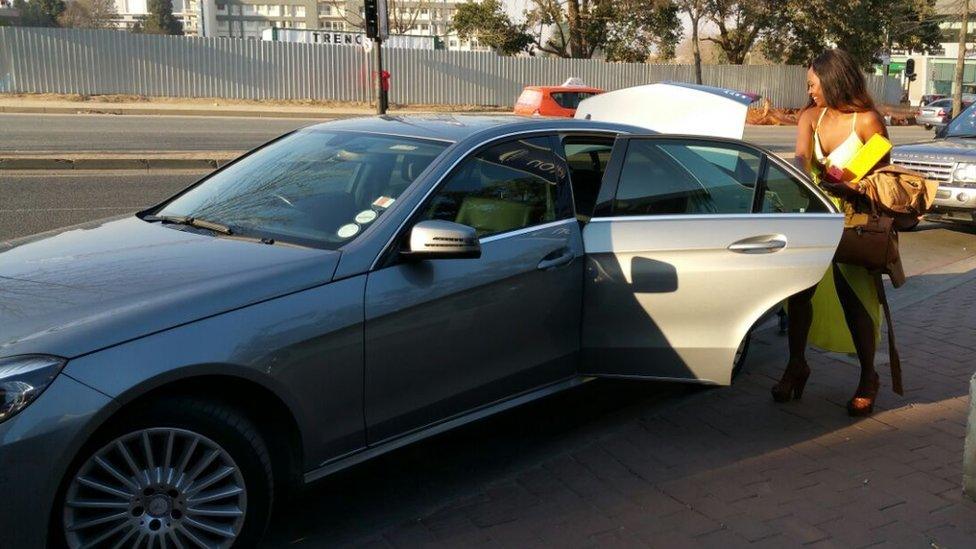
The number of people using Uber to book taxis in South Africa has risen sharply
In recent weeks, drivers of Uber, the app-based taxi firm, have been at the receiving end of the wrath of Johannesburg's notoriously tough traditional metered taxi drivers.
Taxi drivers in South Africa have had a fierce reputation dating back to the days of apartheid and have often resorted to violence to protect their routes.
The dispute with Uber drivers began a week ago but tension has been simmering for months.
In the posh business area of Sandton, a passenger was pulled out of an Uber car a week ago and the driver was threatened with whips and batons.
The meter taxi drivers say they are angry with Uber for taking their customers, and making business difficult for them.
"Uber must go," said Lucas Seale, a spokesman for the body representing metered taxi owners in South Africa's economic heartland of Gauteng province.
'Gun drawn'
It may sound ridiculous to bring in apartheid into a 21st-Century taxi service which is largely run by a smart-phone application.
But let me explain: Under apartheid the white minority government had neglected to provide reliable public transport for the majority of South Africans.
Mostly black individuals with an entrepreneurial spirit took it upon themselves to start an informal taxi service. They have been running it for decades.
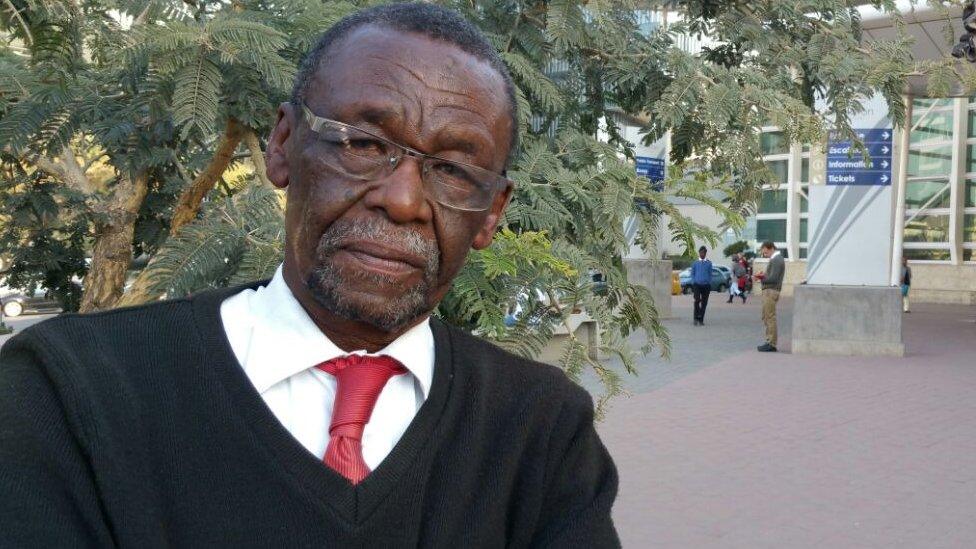
Old taxi drivers like Peter Moloi believe Uber is getting preferential treatment from the authorities
Now the government wants to regulate it and it is finding it difficult to penetrate the multi-billion dollar industry. Minibus taxis ferry millions of people every day to and from work. They provide an essential service.
And it is under this tense climate that the innovative Uber business idea has arrived.
Uber customer Melinda Bason told South Africa's private Eyewitness News site that her Uber driver was too scared to pick her and her husband up from Sandton after being harassed by the metered taxi drivers.
"They grabbed the keys from the ignition, intimidating him. There was a gun involved and intimidation with that weapon," she said.
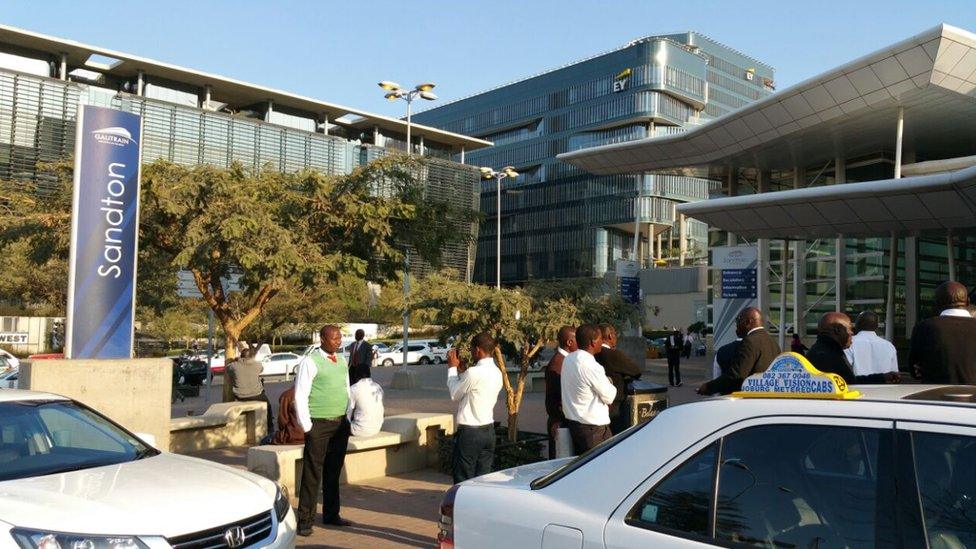
Sandton is a wealthy suburb where taxi drivers compete for business

Uber in Africa
Launched in Johannesburg in 2012
Operating in Lagos since 2014
Started rolling out a service in Nairobi in February

Passengers say Uber prices are cheaper and its cars are much cleaner.
In Cape Town, an online petition, external has been launched after 200 of its cars were impounded for operating without licences. By Monday, it had gained 20,000 signatures.
Charlotte, a regular Uber customer who did not want to give her surname for fear of reprisals, told me that she has found ways of using the service, undetected by metered taxi drivers.
"I ask them to pick me up away from designated pick-up spots in order to enjoy the cheaper service without being intimidated."
She adds that because she sees the name and picture of the driver on her smartphone application, she can pretend she knows them personally.
"I greet them as if they are my long lost friend," Charlotte says.
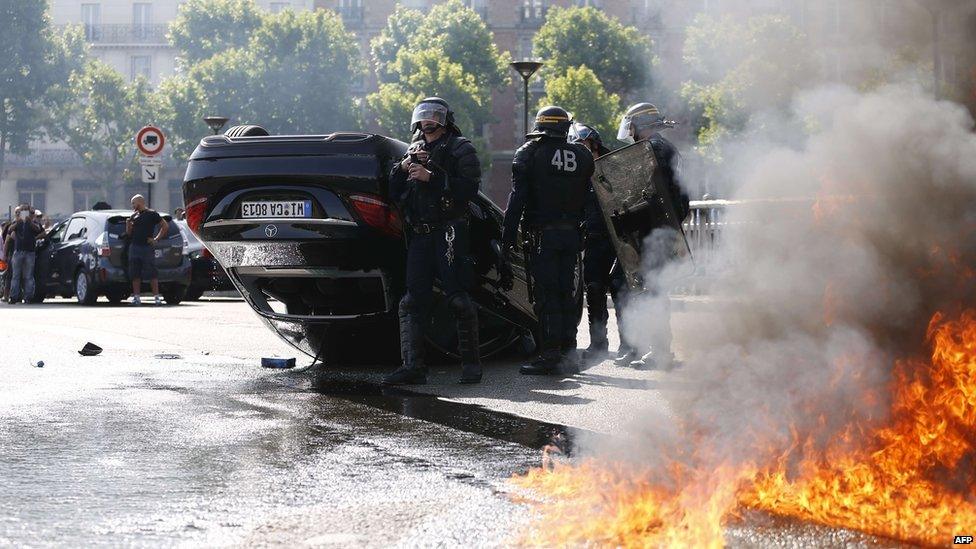
Uber has faced protests in other cities as well, including Paris
Uber, which is headquartered in San Francisco in the US, said it was aware of similar incidents where taxi drivers refused to share routes.
Its Johannesburg general manager, Alon Litz, said in statement that intimidation was getting worse.
"We are in constant communication with the drivers assuring them that their safety is our number one priority. We're looking into ways to reduce cases of intimidation," he said.
'Like third-class citizens'
Uber has appealed to the Johannesburg metropolitan police to protect their drivers. Its spokesman, Superintendent Wayne Mienaar, told me they were monitoring the situation.
"Our role is to ensure the safety of both passengers and drivers," he said.
I spent some time outside the Gautrain station in Sandton with metered taxi drivers. They were all wearing their customary uniform, white shirts and red ties. They looked somewhat agitated but elegant.
South Africa taxi drivers clean up their image
I asked 70-year-old Peter Moloi what problem he had with Uber?
He replied, in a soft and dignified voice, that Uber annoyed him because it had jumped the queue for operating licenses.
Mr Moloi, who was retrenched from his job as a credit controller in 1999, said: "We are tired of being treated like third-class citizens in our own country."
He said the foreign-owned firm received its taxi licence quickly, compared with some of his colleagues who had waited for years.
Uber in South Africa had one million rides in 2014 - in the first half of this year it has already reached double that.
This means the incidents of violence and intimidation we are witnessing are still in the minority. There are fears though, that the fighting might escalate.
- Published15 May 2015
